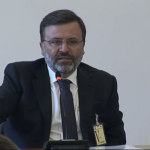Lithium competition postponed
The Portuguese government has postponed the competition for contracts to extract lithium ore in Montalegre until the end of 2021.
One of the reasons why has to do with the fact that the Mining Law has only now just been ratified, seven months after having been passed by the Council of Ministers on 14 October.
The competition was for the award of lithium mining prospection and excavation rights in eight areas deemed to be rich in lithium ores. The competition was to have been launched between July and September of this year.
However, the competition has been put off until the end of the year without a specific date being fixed. It is even possible that the competition could be scheduled for 2022 according to Capital Verde.
On Wednesday, the minister for the Environment and Climate Action, Matos Fernandes, revealed that the environmental impact strategic study for the award of lithium prospection and mining rights in eight areas of the country will be published by November and not April as had been initially expected.
In an opening address at the High Level Green Mining conference hosted by the Portuguese Presidency of the Council of the European Union, the minister said that the competition for the award of additional lithium (ore) exploration rights in Portugal was awaiting an environmental impact study “which is underway and should be published by November this year.”
At the beginning of February, a government dispatch was published which defined the environmental impact study as for 2 November and which had to be undertaken before any competitive tender competition could be launched in the eight areas of Portugal listed (it had originally been 11 areas).
It gave the Directorate General of Energy and Geology five months to complete its impact study (in other words by 2 April 2021).
However, it now states “the period is now seen as insufficient, not only because it has taken several months for the Mines Law to be ratified (approved in the Council of Ministers on 14 October 2020) just last Sunday, 2 May, but also because of the entire complexity of the environmental impact strategic study process.
However, despite various sites mooted for lithium ore exploration, the controversial Montalegre mine project, which has garnered considerable opposition from locals and environmental pressure groups, may not go ahead at all. Portugal’s environment minister said at the end of last month: “At the moment I see the possibility of a lithium mine in Montalegre as very unlikely.”
The EU is trying to set up an independent stream of crucial raw materials to ensure it is not dependent on third countries. It imports almost all of its lithium — a key ingredient in the batteries used to power electric vehicles.
The European Commission estimates that demand for lithium will grow 18 times by 2030 and 60 times by 2050. That’s set off a race to open mines in Europe, with projects being eyed in Finland, Spain, Serbia, the Czech Republic and Austria, as well as Portugal.
Reacting to the postponement, mining company LusoRecursos’s CEO Ricardo Pinheiro said that if the Montalegre project was shelved his company would bring a “pretty lawsuit in the courts” against the Portuguese government.
The minister’s comments could mean the end of one of Lisbon’s signature raw material schemes, just one week before the Portuguese presidency of the Council of the EU hosted the conference on green mining.










